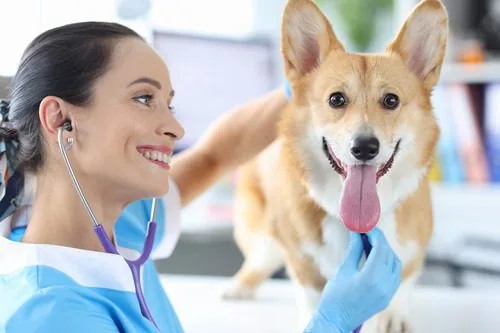What is Cushing’s Disease in Dogs?
Every pet parent should be informed of the symptoms of Cushing’s disease in case your dog has it. Hyperadrenocorticism, commonly known as Cushing’s disease, Cushing’s disorder, or even Cushing’s syndrome, can occur in dogs, cats, and humans. However, dogs are more likely to get the disease and are more susceptible to the adverse side effects.
Cushing’s disease happens when the adrenal glands produce too much cortisol in the dog’s body. Cortisol is an essential hormone that helps it respond to stress, regulate the immune system, and control sugar levels. When the body has too much cortisol, life-threating illnesses and conditions can arise.
Most people know cortisol is associated with the “fight or flight” response. The pituitary is a tiny gland positioned at the base of the brain and distributes adrenocorticotrophic hormone to the adrenal glands, which signals the body to release cortisol.
When a dog has Cushing’s disease, a tumor in the pituitary gland or the adrenal gland triggers the release of an excessive amount of cortisol. A tumor more often causes Cushing’s disease in the pituitary gland than the adrenal gland.
If you are a dog parent, read on to learn more about Cushing’s disease in dogs and treatment options.

What Are the Symptoms of Cushing’s Disease?
One of the characteristics of Cushing’s disease is a pot-bellied appearance in the dog, which is caused by the enlargement of the liver and the shift or reallocation of body fat. When this happens, the abdominal wall muscles become weak and typically shrink in size. The following include some of the other symptoms of Cushing’s disease:
- Excessive panting

- Lack of energy
- Increased thirst
- Increased urination
- Increased appetite
- Hair loss
With Cushing’s disease, the dog has a more significant risk of bacterial skin infections. There may also be an increased prevalence of urinary tract infections. Increased appetite can result from an elevation of cortisol in the body. A poor hair coat is also typical in dogs with Cushing’s disease.
What Are the Causes of Cushing’s Syndrome in Dogs?
There are three types of Cushing’s disease, and there are a few causes that could affect your pup. The dog’s prognosis will often depend on the condition’s cause.
Pituitary Gland Tumor
The pituitary gland is responsible for the creation of hormones in the body. A tumor on the pituitary is a common cause of Cushing’s disease in dogs. The tumor can be either benign or malignant. The tumor triggers the pituitary gland to produce the adrenocorticotropic hormone in excess, which causes the adrenal glands to generate more cortisol.
The pituitary gland responds by producing less adrenocorticotrophic hormone, which makes the body produce less cortisol. The symptoms present depend on the size of the tumor. If the pituitary gland can be regulated with medication, symptoms may subside, and the dog can live a normal life for many years. If the growth is significant, it can affect the dog’s prognosis.
Adrenal Gland Tumor
There can be a benign or malignant tumor of the adrenal gland, but this is far less common. Tumors that originate from the cortex are usually adenomas or adenocarcinomas. They may generate sex hormones cortisone or aldosterone, which causes severe damage. When the tumor comes from the medulla, it will typically distribute adrenaline.
When adrenaline is constantly in the body, it leads to the dog having high blood pressure. Malignant tumors can spread throughout the body. Another type of adrenal tumor can grow from the vein of the adrenal gland to the vena cava, which is referred to as a tumor thrombus. These tumors are caused by continuous stimulation of the adrenal cortex.
Prolonged Use of Steroids
When there is excessive use of steroids, it can cause Iatrogenic Cushing’s disease. Even though the steroids may have been given for a legitimate reason, the outcome is a health condition. Some of the legitimate reasons why the dog may have been given steroids:
- Allergies
- Autoimmune diseases
- Immune-mediated skin conditions
The most common reason for steroids to be administered to a dog is to suppress the inflammation associated with an allergic response. When steroids are given in high doses, they act as immunosuppressant drugs and prevent an immune response.
Sometimes when a dog is on steroids long-term, medication-induced Cushing’s disease will develop. In an effort to minimize the risk, steroids are usually tapered down over time, or several other medications are used to treat the issue.
 Are There Treatment Options for Cushing’s Disorder?
Are There Treatment Options for Cushing’s Disorder?
The therapy for your pup will depend on the origin and which type of the disease is present. Cushing’s is usually a lifelong disorder in dogs, and many of the pups diagnosed are often older. Most veterinarians treat adrenal and pituitary tumors with medication.
Pituitary Tumor
Treatment of a pituitary tumor is very involved. Trilostane and Mitotane are often given to the dog, as they have been proven to be very effective medications for pituitary tumors. Surgical techniques to remove these tumors are being studied, but surgery is not very often the route veterinarians take with this particular condition.
Adrenal Tumor
The only way to cure the dog of Cushing’s disease caused by a neoplasm on the adrenal gland is to remove it surgically. This removal is viable as long as the tumor has not spread. Due to surgery being an incredibly risky option, medications are often the treatment that veterinarians lean towards. However, sometimes surgery can be successful, and dogs have regained their health.
Iatrogenic Cushing’s Disease
Treatment for this condition necessitates the cessation of steroids. It is a delicate situation that must be handled with care, or it may cause further harm. The use of steroids may have led to an unfavorable impact on the adrenal gland, and therapy is often essential to helping replace the hormones that the adrenal gland typically generates.
- Vetoryl is the only drug approved by the FDA to treat pituitary and adrenal gland tumors in dogs. It decreases the creation of cortisol in the adrenal glands. In most cases, you may see that the dog’s appetite and thirst decrease to an average level within an initial couple of weeks of treatment.
- Dogs with Cushing’s Disease can live great lives if the pet parent and veterinarian work together to help the pup recover. The veterinarian must closely monitor the dog, and the dog’s parents should ensure they bring them in for regular check-ups and blood work. Medication should also be monitored and adjusted when necessary.
Conclusion
Cushing’s disease is a complex disease with a few possible causes, and treatment depends on the direct cause. If your canine exhibits any symptoms mentioned in this article, do not hesitate to get them to the vet. As a pet parent, the health and wellness of your pup should be your number one priority.
For pup parents in the Atlanta, GA region, The Village Vets is here to answer questions about Cushing’s disease in dogs. Call us today at (404) 371-0111 or make an appointment online at one of our many locations!
Recent Posts
About The Village Vets
The Village Vets is a network of animal hospitals based in Atlanta, GA and the surrounding area. We offer honest, excellent service to our clients in a comfortable, friendly atmosphere. To learn more about our locations and how we can better serve you and your pet, click the button below.
Share This Post
Recent Posts
About The Village Vets
The Village Vets is a network of animal hospitals based in Atlanta, GA and the surrounding area. We offer honest, excellent service to our clients in a comfortable, friendly atmosphere. To learn more about our locations and how we can better serve you and your pet, click the button below.



